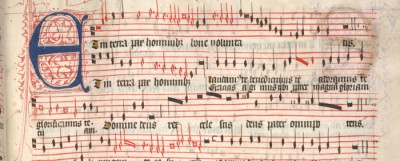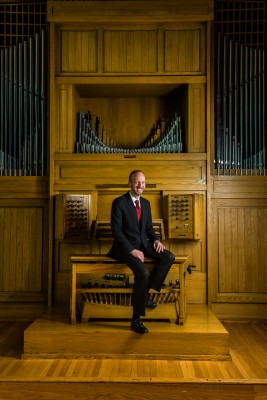 Unique: a word we use so often that perhaps we sometimes forget what it means.
Unique: a word we use so often that perhaps we sometimes forget what it means.
An adjective meaning the only one of its kind, or unlike anything else, we could interchangeably use words like distinct, individual, and special.
On Nov. 10, Dr. Joel Bacon, Chair of Organ and Liturgical Studies and associate professor of Organ at CSU, along with organ and music history students, presents a unique evening of medieval liturgical music featuring organ and Gregorian chant. For the collaborative project, organ students will be joined on alternating pieces by an ensemble of ‘chanters’ or singers of Gregorian chants, assembled by, and including, Dr. Bacon.
Liturgical organ music and Gregorian chant are some of the oldest notated music known to western civilization with some manuscripts dating as many as 1,000 years old.
 “I love this kind of music,” said Dr. Bacon. “It’s very freeing…unlike anything else we do in the music department,” adding “[this event] will be a mystique experience.”
“I love this kind of music,” said Dr. Bacon. “It’s very freeing…unlike anything else we do in the music department,” adding “[this event] will be a mystique experience.”
Gregorian chant – early Christian church liturgy (customary repertoire of observances) – consists of a single line of melody with a flexible rhythm, sung to Latin words by unaccompanied, typically male, voices. The style of the music is uncomplicated and melodic allowing the audience (originally monks in a monastery) to pause and reflect in a peaceful atmosphere. While Gregorian chants have remained popular, even having a sort of resurgence in the late 20th century, it’s a rare and unique opportunity to hear such a performance outside of a religious setting.
Unlike Gregorian chant, which has stayed essentially the same since medieval times, organ music has changed drastically. “Organ music from the Middle Ages is vastly different from what we think of today as organ music,” said Dr. Bacon. “For one, there were no pedals at the time and that changed the way the music was written, let alone performed.”
For a distinct and tranquil experience, look no further than the Medieval Music Recital: a free evening of medieval liturgical music featuring organ and Gregorian chant.
~ by Spencer Gillard

